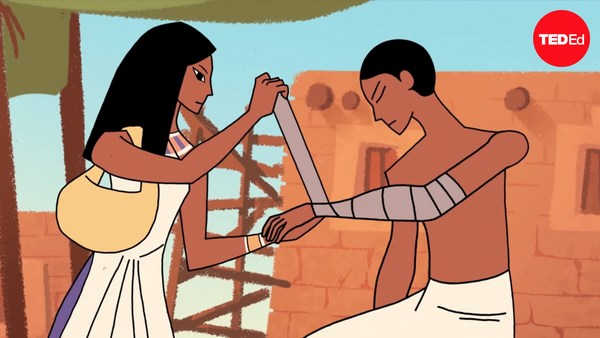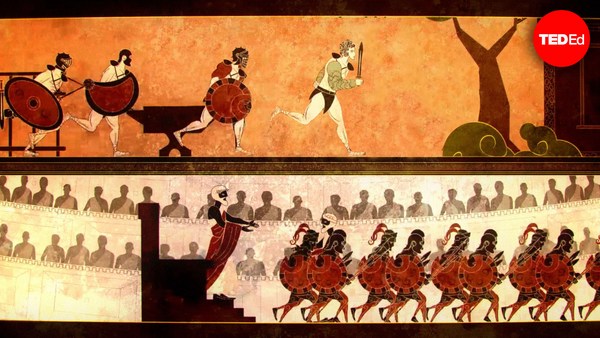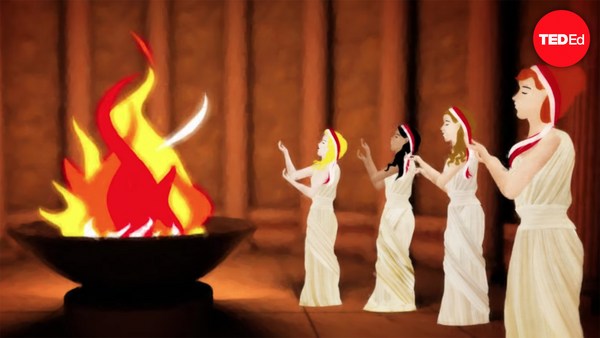It's March the 17th in A.D. 73. We're visiting ancient Rome to watch the Liberalia, an annual festival that celebrates the liberty of Rome's citizens. We're looking in at a 17-year-old named Lucius Popidius Secundus. He's not from a poor family, but he lives in the region known as the Subura, a poorer neighborhood in Rome, yet close to the center of the city. (Gong) The tenants of these apartments are crammed in, (Grunting) which poses considerable risk. Fires are frequent and the smell of ash and smoke in the morning is not uncommon. Lucius, who awoke at dawn, has family duties to perform today. (Cheering) His 15-year-old brother is coming of age. Half the children in ancient Rome die before they reach adulthood, so this is a particularly important milestone. Lucius watches his brother stand in his new toga before the household shrine with its protective deities, as he places his bulla, a protective amulet, in the shrine with a prayer of thanks. The bulla had worked. It had protected him. Unlike many others, he had survived to become an adult. At 17, Lucius has almost completed his education. He has learned to speak well, make public speeches, and how to read and write both Latin and Greek. His father has taught him the types of things you can't learn in the classroom: how to run, how to swim, and how to fight. Lucius could choose, at 17, to become a military tribune and command soldiers on the edge of the Empire. But in other ways, Lucius is still a child. He's not trusted to arrange business deals. His father will take care of that until he is 25. And Dad will arrange Lucius' marriage to a girl 10 years younger. His dad has his eye on a family with a 7-year-old daughter. Back to the Liberalia. As Lucius leaves with his family, the shops are open as the population goes about its business. The streets are full of itinerant traders selling trinkets and people bustling from place to place. Large wagons are not allowed in the city until after the ninth hour but the streets are still crowded. Fathers and uncles take the kids to the Forum Augustus to see statues of Rome's famous warriors like Aeneas, who led Rome's ancestors, the Trojans, to Italy. And Romulus, Rome's founder. And all the great generals of the Republic from more than 100 years earlier. Lovingly, we can imagine fathers and guardians with their now adult children remembering stories of Rome's glory and re-telling the good deeds and sayings of the great men of the past: lessons on how to live well, and to overcome the follies of youth. There is a sense of history in this place, relevant to their present. Romans made an empire without end in time and space. (Thump) Rome was destined to be eternal through warfare. Wars were a fact of life, even in A.D. 73. There are campaigns in the north of England and into Scotland, to the north of the River Danube into Romania, and on the frontier between Syria and Iraq to the east. It's now the eighth hour -- time to head for the baths. Lucius and his family head up the Via Lata, the wide street, to the Campus Martius, and the enormous Baths of Agrippa. The family members leave the clients and freedmen outside, and enter the baths with their peer group. Baths would change from dark, steamy rooms to light ones. The Romans had perfected window glass. Everyone moves from the cold room to the tepid room and to the very hot room. (Man) Oops! More than an hour later, the bathers leave massaged, oiled, (Whistling) and have been scraped down with a strigil to remove the remaining dirt. At the ninth hour, seven hours after they left home, the men return for a celebratory dinner. Dinner is an intimate affair, with nine people reclining around the low table. Slaves attend to their every need if the diners, through gestures, demand more food and wine. As the day closes, we can hear the rumble of wagons outside. The clients and freedmen, with a meal of robust -- if inferior -- food inside them, shuffle off to the now tepid baths before returning to their apartment blocks. Back at Lucius' house, the drinking continues into the night. Lucius and his stepbrother don't look too well. A slave stands by in case either of them needs to vomit. With hindsight, we know Lucius' future. In 20 years' time, the Emperor Vespasian's youngest son, Domitian, as emperor, will enact a reign of terror. Will Lucius survive? (Drums)
Related talks

Elizabeth Cox: A day in the life of an ancient Egyptian doctor

Fiona Radford: From enslavement to rebel gladiator: The life of Spartacus

Adrienne Mayor: Did the Amazons really exist?

Peta Greenfield: Who were the Vestal Virgins, and what was their job?

Jon Lowenstein: Family, hope and resilience on the migrant trail
